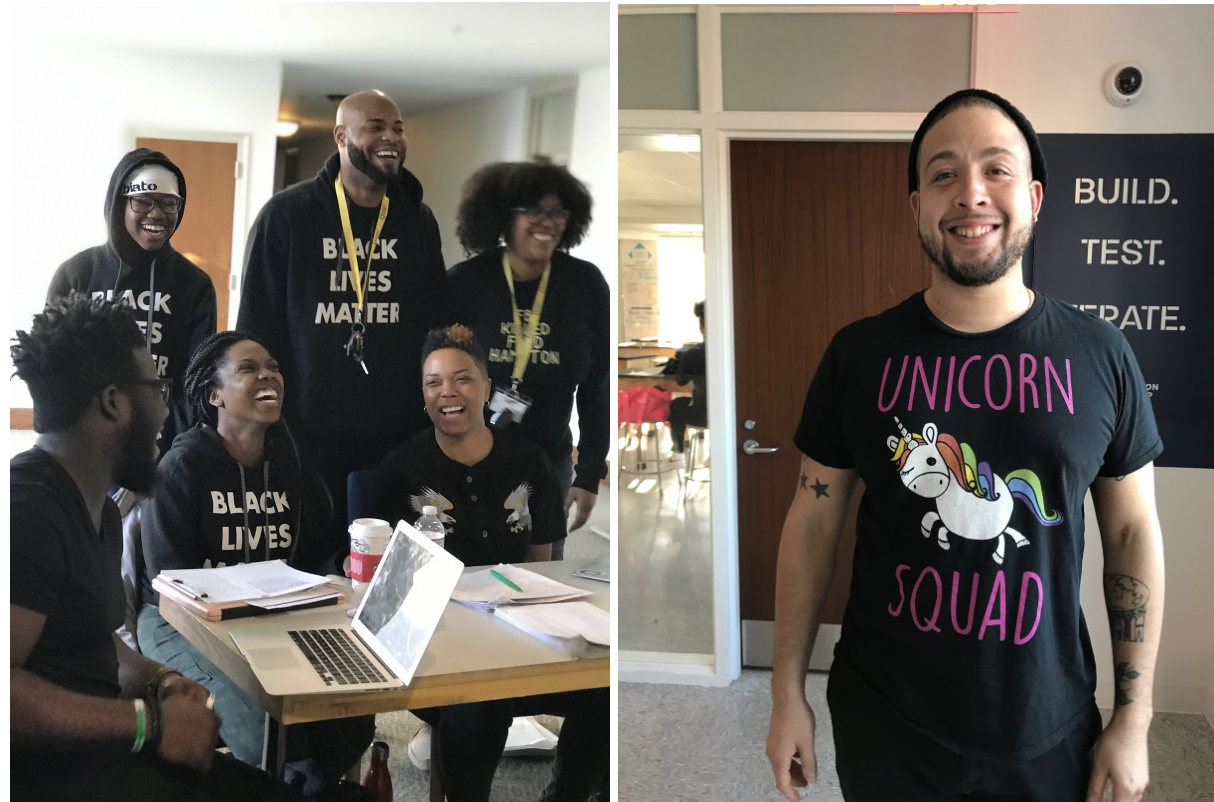A poster hanging in the hallway between the teacher’s lounge and leadership office at Washington Leadership Academy (WLA) reads, “We Signed Up For This.”
A printout of student achievement targets hangs behind Executive Director Stacy Kane’s desk with “Our Kids, Our Goals” in large font across the top.
“Everyone Owns Everything”
English teacher Chrystal Miller said the school’s motto is “everyone owns everything,” while math teacher Rusty Lee said the school’s infrastructure is based on “embracing a collective approach.”
Located in Washington, D.C., WLA opened in fall 2016 and welcomed its third class of freshmen this fall to bring the total student enrollment to approximately 300 students in grades 9–11. WLA serves a diverse, high-poverty student population with over 85 percent qualifying for free/reduced lunch and more than 40 percent coming from the poorest areas of the city.
It’s a school committed to changing the life trajectories of students by building trusting relationships and giving students new and challenging opportunities to learn and to lead. Students at WLA take rigorous core classes, enriched by real-world experiences and access to experts, and participate in student-selected projects and electives — all enhanced by the latest in technology and innovation.
Getting Hands-On With Emerging Tech
All WLA students take computer science and get hands-on experience with emerging technology, including virtual and augmented reality. In fact, WLA tripled the number of African-American students taking AP computer science in D.C. in its first year and WLA has set multiple records for access to computer science since.
Two weeks in and our students are taking complete ownership of their schooling. Academic and behavior reflections on deck in advisory. #Scholars #Ourkids #WLARocks pic.twitter.com/D7li8Ep0y7
— WLApcs (@WLApcs) August 29, 2018
The Team Ethos is No Accident
As one of the XQ Institute Super School Design Challenge winners, WLA regularly welcomes XQ members to visit and learn from their journey to rethink high school. If there’s one takeaway from time spent at WLA, it’s that the team at WLA is just that – a team.
The team ethos is no accident. From staff development before the school year to daily practices that encourage ongoing communication and collaboration, the WLA collective culture is one that school leaders intentionally cultivate and develop over time. When the goal is preparing students to succeed in the finest college and universities and serve as tomorrow’s leaders, a collective approach of shared responsibility is essential.

Morning Huddles
Every morning at 7:30, the WLA staff gathers to talk and plan for the day. This “morning huddle” keeps them grounded as a team and community. On the day we visited, science teacher Dr. Steve Robinson kicked off the circle with a reflection of gratitude. Natalie Gould, Director of Operations, highlighted the good work of a few teachers through a “shout out,” before another teacher announced an upcoming event involving girls and coding. The huddle ended with everyone putting their hands in the middle and shouting, “Cultivate the Karass” – a personal staff motto meant to keep each individual focused on their role as part of a team.
A Collective Approach
Executive Director Stacy Kane and Chief Academic Officer Joey Webb shared more about WLA’s collective approach, how it’s developed, and how it all adds up to a school that gives students wide access to academic opportunity.
Joey explained the immersive learning experiences they created for staff to build group identity and establish trust. Examples include “false conflicts” like escape rooms or IKEA furniture-building challenges, as well as “speed bonding” sessions using the New York Times’ 36 Questions that Lead to Love, and group discussions on the best-selling book, The Five Dysfunctions of a Team. In fact, everything at WLA is collaborative – from the way teachers ping each other on Slack for help with “just-in-time” student support, to the way WLA leaders deliberately build staff capacity through coaching and three hours a day of planning time.
Every teacher is assigned a coach who is one of their peers at WLA. They meet for 15 to 30 minutes daily to review goals as well as results from student achievement data that indicate where instruction can be improved. Coaches review lesson plans, engage regular classroom observations and have a list of specific “look-for” aligned to that teacher’s goals.

The Importance of Shared Leadership
It’s clear in our conversation with WLA leaders that they understand the importance of shared leadership, diversity in decision-making, and building internal capacity among staff. All of this adds up to students who have the support they need.
“WLA has super high expectations for adults and kids,” explained teacher Chrystal Miller. “They [both] have opportunities they wouldn’t have otherwise…Being here has eradicated my concept of a teacher on an island. Now I feel the thread of all of our work being interwoven all the time.”
Teacher Rusty Lee added, “This is not, ‘What happens in your room, stays in your room.’ ”
Chrystal said this all comes down to the “sense of agency” teachers and students feel. “Everyone has liberty and freedom to act and voice their opinion.”
XQ Super School Washington Leadership Academy from XQ America on Vimeo.
A Sense of Agency and Empowerment
This sense of empowerment connects to the various roles that teachers play at WLA. Eleventh-grade Team Lead Britney Wray explained, “We have many hats. They never come off. I am a counselor, I am a friend of the parents? We’re college counselors, we’re guidance counselors, we’re partnership developers? We care about our kids, we want them to see the best of themselves – teaching them self-beauty, teaching them self-confidence, teaching them so much more than how to multiply and divide.”
Jaishri underscored the importance of the “Our Kids, Our Goals” philosophy. “They’re not ‘these kids’ or ‘those kids,’ they’re not even ‘students,’ they’re ‘our kids’. You see that play out in every moment.”
It’s especially poignant to hear this from teachers because it validates the comments we heard from students during our roundtable with them earlier that morning. We were only a few minutes into our discussion when freshman Lesley Rojas described her teachers as caring and loving. “They love us so much and we love them, too,” she said. “That’s family, you know. We’re WLA family.”
It’s Not All Unicorns and Rainbows
But it’s not all unicorns and rainbows at WLA. It takes a lot of work to create a culture of relationships coupled with high expectations for academic rigor and removing barriers to opportunity for high-poverty students and students of color – all while getting the kinds of results that confirm this approach is working.
Director of Operations Natalie Gould believes building a collective culture in support of students requires that leaders “find people who share your values and find people who want to build with you, not people who want it built for them.”
Acknowledging the sometimes Herculean nature of teaching at a school like WLA, Chrystal said, “If you are not willing to till the soil, then this is not the place for you. If you think of [building a school like WLA] like the process of planting a seed, [it grows] but you don’t see the work that’s done underneath the ground? We’re the dirt diggers.”
For more on Washington Leadership Academy, click here.
Follow the journey of all 18 XQ Super Schools and tell us how you are joining the movement on Twitter, Facebook, Instagram, and with the hashtag #ReThinkHighSchool.
TAGS:



 Tweet
Tweet 



